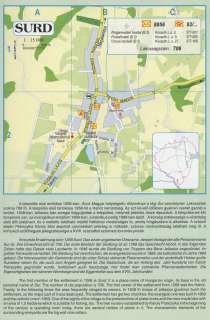| 1.02 MB | |
| 2008-04-21 13:56:50 | |
 | |
Nyilvános 2347 | 9263 | SURD | A település első említése 1268-ban: Surd. Magyar helységnév, előzménye a régi Sur személynév. Lakosainak száma 706 fő. A település első birtokosa 1268-tól a Hahót nemzetség. Az ezt követő időkben gyakran cserélt gazdát a terület. 1848-ban Jellasics bán seregei felgyújtották a települést, melynek jelentős része elpusztult. A településnek két temploma van, az evangélikus templom 1869-ben, a katolikus pedig 1989-ben épült. A község érdekessége a védettség alatt álló platánsor, és a mellette található másfél hektárnyi mesterséges tó, amely horgászásra is alkalmas. A század elején Petrezylka Károly által alapított csemetekert jelenleg is működik, számos növényritkaság található meg itt. A környező szőlőhegyek jellegzetességei a XVIII. századból származó boronás pincék. Ihre erste Erwähnung ist in 1268 Surd. Das ist ein ungarischer Ortsname, dessen Vorlage der alte Personenname Sur ist. Ihre Einwohnerzahl ist 706. Der erste Besitzer der Siedlung ist ab 1268 das Geschlecht Hahót. In den folgenden Zeiten hatte das Gebiet viele Landwirte. In 1848 wurde die Siedlung von Truppen des Bans Jellasics angezündet, ihr größer Teil wurde vernichtet. Die Siedlung hat zwei Kirchen, die evangelische wurde in 1869, die katholische im Jahre 1989 gebaut. Die Interessanten der Gemeinde sind die unter Schutz stehende Platanenreihe und der anderthalb Hektar große Kunstsee neben ihr, die auch zum Angeln geeignet ist. Die Saatschule, die am Anfang des Jahr-hunderts von Károly Petrezylka gegründet wurde, funktionert auch heutzutage, hier findet man zahlreiche Pflanzenseltenheiten. Die Eigenartigkeiten der näheren Weinberge sind die Eggenkeller aus dem XVIII. Jahrhundert. The first mention of the settlement in 1268 is Surd. It is a place-name of Hungarian origin, its base is the old personal name of Sur. The number of uts population is 706. The first owner of the settlement from 1268 was the Hahót-Family. In the following times the area frequently chnged its owners. In 1848 th troops of Jellasics governor burnt the settlement, so the major part of it was destroyed. The settlement has got two churches: the evangelic one was built in 1869 and the catholic one in 1989. One of the sights of the village is the protected line of platan trees and the man-made lake with an area of 1,5 hectares which is suitable forfishing, too. The tree nursery established by Károly Petrezylka in the beginning of the century is operating even today, there are several rarities of plants in it. The characteristic elements of the surrounding vineyards are the log wall vine-cellars. A részlet a következő kiadványból származik/Die Teile stammen vom volgenden Buch/This text came from the following book: Cím/Titel/Title: Zala megye településeinek atlasza - 257 település részletes térképe/Atlas der Komitat Zala - 257 Detailte Siedlungskarten/Zala county\'s Atlas - 257 settlement maps. Közreműködő/contributor: Lackner László (1943) (fotó) Kiadás/Ausgabe/Publisher: Gyula : HISZI-MAP, 1997 Sorozat/Serie/Series: Indulástól - megérkezésig... ETO: 912(439.121-2) ; 908.439.121 Cutter: Z 19 ISBN: 963-610-025-4 Oldalszám/Seiten/Pages: 323, 81 p. Megjegyzés/Note: Lezárva/Abgeschlossen am/Closed am: 1997. máj. 30. |
